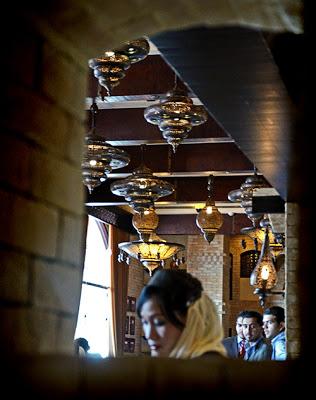 When I started the year, I thought over a few of my highlights of the last. Can you remember me mentioning Arva Ahmed of Frying Pan Adventures? Well, I've recently been on a second tour with Arva, and it was even better than the last. So much so, that she has aroused in me a desire for a whole series of posts rather than just one about the tour itself.
When I started the year, I thought over a few of my highlights of the last. Can you remember me mentioning Arva Ahmed of Frying Pan Adventures? Well, I've recently been on a second tour with Arva, and it was even better than the last. So much so, that she has aroused in me a desire for a whole series of posts rather than just one about the tour itself.She's an inspirational lass. She shows her clients that there is quite a bit more to our Asian restaurants of Dubai than a cheap curry or a tasty shawarma take-out. And as I write this from my hotel in Adelaide, this is reinforced ten-fold. I started thinking about Masqouf (you'll find out more about that below). And I thought - I have a few hours... Maybe I could go and get an Iraqi hit somewhere? But no. There is not a single Iraqi restaurant in Adelaide. In fact, there only seem to be about 8 middle eastern restaurants total, and that counts shoddy corner kebeb places that only get haunted for Souvlaki at 1am when the pub closes. There is one Iraqi restaurant in Melbourne (my home town), and they serve kebabs, humus and pizza. Sydney also seems to have just one, but they have a reputation for snarling at customers rather than serving them.
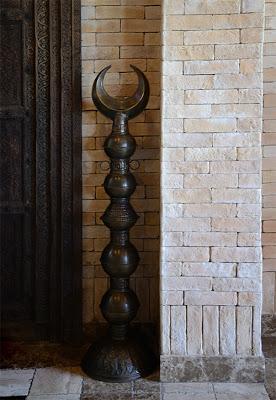
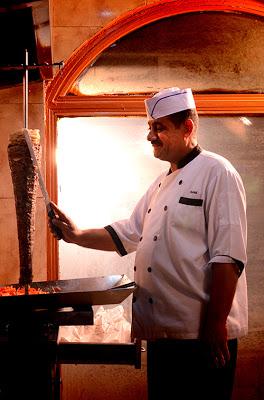
Dubai really is an incredible place for food, and after a few months of dining in a well of mediocrity in this city, Arva has helped me realize this again. The challenge is to quash that Australian (and probably European too) ideal of needing to have a glass of wine with a meal. Liquor licensing in Dubai is limited (as you would probably expect in a Muslim country), and if we want to get the best of what Dubai has to offer - particularly when it comes to small, family owned restaurants and traditional cuisine - we really do need to haul out of the fancy hotels and give up the vino now and then. And so, post one, dedicated to Miss Frying Pan, is about Iraqi cuisine, which you will never find accompanied by a rosewater and gold champagne cocktail at a glamolith of the Dubai hotel industry. We're talking a simple, cheap, tea-drinking experience in the crummy old streets of North bank Dubai. Firstly, I'll share a little about what she taught me about Masqouf, and then, what I have learned since I left her tour.
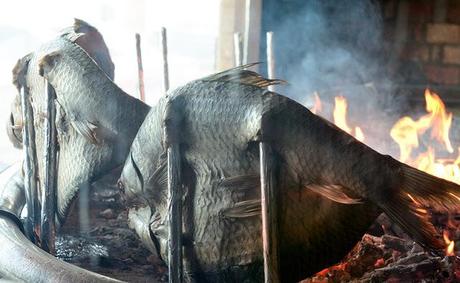
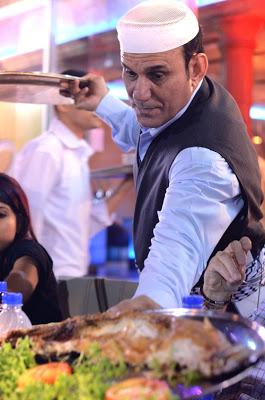
- Masqouf (also spelled meskhuf and masgouf) is an Ancient Sumerian way of cooking fish. Shabout, Boni or Katan (varieties of Carp) caught in the Euphrates or the Tigris are split open, and then fired on spiked beside logs and embers of smoking fig or apricot wood. They are positioned alongside the flame rather than on it, butterflied and vertical, meaning that the cooking is slow, and imparts a gentle smokey flavor. What you end up with is soft, mild and incredibly tender, flaky white fish, which is served with a tomato and green mango pickle. On the night, Arva explained its emotional link to the famous street of Abu Nuwas on the Tigris. I'm not going to tell you what that is - you're going to have to book the tour and let her tell you herself.
It opened up a whole new world of carp to me. I had previously only associated it with the muddy-flavoured and super-survivor-envorionmental-disaster-of-the-Murray-River fish that ate all the food of our indigenous fish, thereby killing them off little by little. And then I also picture it as the $5 per kilo monstrous creature being shoved through fish mincers in stores in my local street for Gefilte, which was this stuff that basically ended up looking like poo preserved in a jar (I'm sorry if you like it... really, very sorry...), or possibly in a slightly prettier version if it was home made. But as I'm not Jewish and never been invited over for Passover (and now, I would imagine, after my previous comment, I probably never will be.... Sorry again) I can't comment on that.
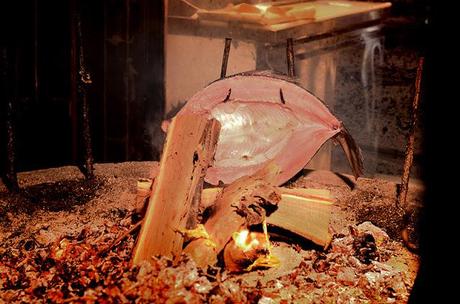
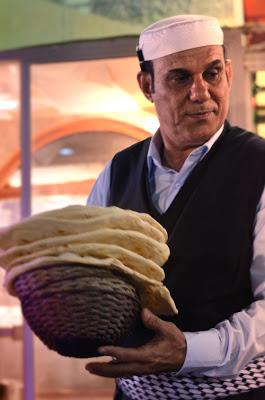 So - Masqouf is the big one to look for. But I've got some more tips for you - and all of these things you can find in various Iraqi restaurants of Dubai.
So - Masqouf is the big one to look for. But I've got some more tips for you - and all of these things you can find in various Iraqi restaurants of Dubai.- Let's start with breakfast (or ryouk). If you're able to make it there in time, that is, or you manage to find a restaurant that serves some of the breakfast dishes all day, you have to try the eggs. Usually the dish will be referred to as makhlama, which loosely translates as omelet, but it goes well beyond what youe would usually whip up in your kitchen. Traditional accompaniments will be minced meat, tomato, broad beans and other vegetables - usually just one or two at a time. The eggs can be scrambled and mixed with the other ingredients, or fried amidst them, or even broken onto the top and baked shakshouka style. Any way, they're good.
If you don't make it in time, that's ok - here's your lunch or dinner checklist.
- Start with qosa, a sesame bread from Mosul. You can dip it in all the usual suspects (humus, moutabel etc), and munch with peppery fat roka leaves, crunchy radish and a small slab of white cheese.
- Kubba Mosul - a bulgar wheat savoury pastry stuffed with minced meat originating in the city of Mosel. Kubbe and kibbeh are basically the same thing, but they will vary in shape and size from country to country, and can differ in their casing (anything from wheat to rice to potato), and their stuffing.
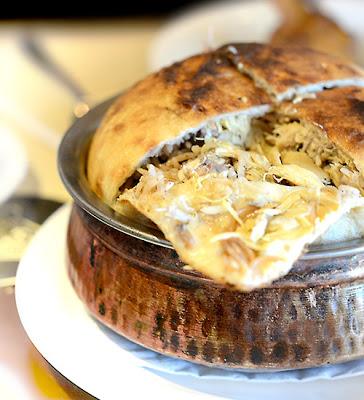 Fesenjan or fasangoon is Persian in origin, but as the area has always been full of travellers and the regions overlapping, recipes will tend to cross cultures. It is a pomegranate and walnut stew, concentrated and rich, usually served with chicken and rice. Also look for Shorbat Rumman, a pomegranate soup with lentils, meat and spices.
Fesenjan or fasangoon is Persian in origin, but as the area has always been full of travellers and the regions overlapping, recipes will tend to cross cultures. It is a pomegranate and walnut stew, concentrated and rich, usually served with chicken and rice. Also look for Shorbat Rumman, a pomegranate soup with lentils, meat and spices.- Quzi is lamb stuffed with rice and spices, often accompanied by raisins and nuts. Sham Quzi is when it comes in a bread dome. This also seems to be known by many other names such as Perde Plau, which in turn resembles the Turkish Perde Pilavi.
- While browsing the meat dishes you might also see the word qawerma. This basically translates as confit, and refers to a fat and salt preserved lamb dish. It's silky smooth but very rich in flavor. Probably not so good on the arteries.
- Ghormeh sabzi (sepzi) - is a herb and spinach stew, flavoured primarily with methi (fenugreek) leaves. Very fragrant.
- Warning - if you get adventurous and order Basha or pasha, prepare for a nightmare to arrive at the table. We're talking whole calves head, offal and all manner of of offcuts which will make your dish sustainable (don't you love it when the whole beast is used?), but might scare off other diners.
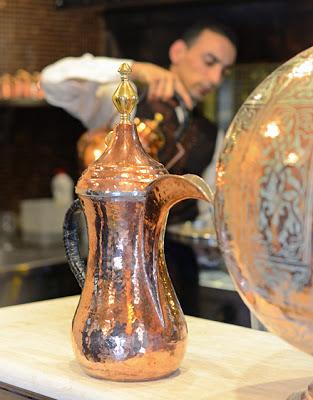 Taghrib/tashreeb is a liquid stew placed in a dish lined with bread. The bread soaks up the juices while the stew cools, and it's gooey and delicious when done right. Chicken is the popular choice, but you'll find it done with anything from lamb to okra to chickpeas to eggs.
Taghrib/tashreeb is a liquid stew placed in a dish lined with bread. The bread soaks up the juices while the stew cools, and it's gooey and delicious when done right. Chicken is the popular choice, but you'll find it done with anything from lamb to okra to chickpeas to eggs.- Eggplants are on every Iraqi menu, and so you'll see the word baytinijan everywhere. If you come across it, Tepsi Baytinijan is the prize - a meat, potato and eggplant layered dish - almost like a moussaka with no cheese and extra tomato.
- Kleicha are cookie-like rolls that come with different fillings - either tamur (date) or joz (half-moon with nuts). We are talking the inspiration for the Fig Newton. What a pity they couldn't get it right.
- Kadaif is the iraqi version of Kunafe - vermicelli pastry with mild white cheese and flavoured with rosewater and cardamom and loaded with liquid sugar.
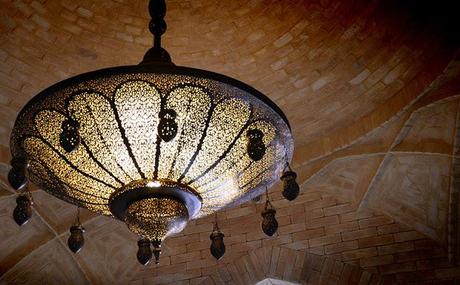 And - where do you go?
And - where do you go?- Arbil (also called Arbel and Irbil) Iraqi kebab restaurant seems to be the one favoured by Iraqis. (I stalked their chat board) No website. Phone 04 272 0843, in Deira on Al Muteena st, just down from the Sheraton. More famous for Kebabs than anything else, but Time Out Dubai's review does say you can get goat testicles there... Nice.
- Raghdan is known for making great tea, but seems to be a step down from Arbil in the kebab stakes. Also in old Dubai, on Muraqabbat Road.
- You'll find Samad al Iraqi just down the road from Raghdan. They have a pretty hit and miss service record, but their food is pretty special. This is one of the better places for breakfast. I like their Jumeirah restaurant - a monolith with spectacular interior design opposite the Jumeirah Beach Park. But the best thing is that it's the only place I've found masqouf on the south side of the creek.
- Arva's favourite, and I'll agree, the best masqouf I've tried, is at Al Bayt al Baghdadi. They also have a very charming kebab man called Sammi, and a super tomato chutney to partner the masqouf if the tart pickle is not your thing. You can read her review on Baghdadi here.
- There are also a few Iranian restaurants around Dubai, where you might find a little Iraqi food on the menu. One of your best bets would be Al Ennab in Mirdiff, who also do a Masqouf, and Iraqi omelets.
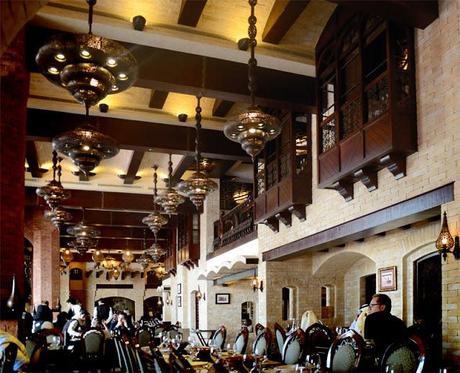
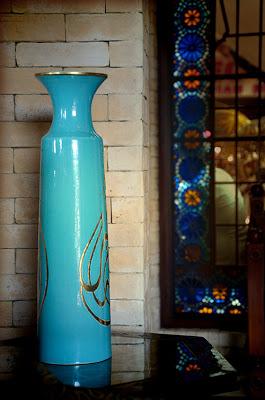
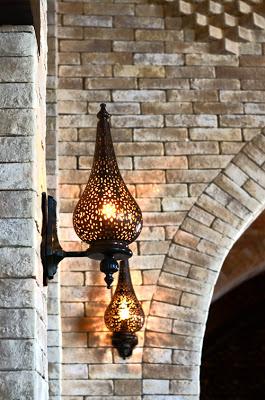
 Fesenjan or fasangoon is Persian in origin, but as the area has always been full of travellers and the regions overlapping, recipes will tend to cross cultures. It is a pomegranate and walnut stew, concentrated and rich, usually served with chicken and rice. Also look for Shorbat Rumman, a pomegranate soup with lentils, meat and spices.
Fesenjan or fasangoon is Persian in origin, but as the area has always been full of travellers and the regions overlapping, recipes will tend to cross cultures. It is a pomegranate and walnut stew, concentrated and rich, usually served with chicken and rice. Also look for Shorbat Rumman, a pomegranate soup with lentils, meat and spices. Taghrib/tashreeb is a liquid stew placed in a dish lined with bread. The bread soaks up the juices while the stew cools, and it's gooey and delicious when done right. Chicken is the popular choice, but you'll find it done with anything from lamb to okra to chickpeas to eggs.
Taghrib/tashreeb is a liquid stew placed in a dish lined with bread. The bread soaks up the juices while the stew cools, and it's gooey and delicious when done right. Chicken is the popular choice, but you'll find it done with anything from lamb to okra to chickpeas to eggs.